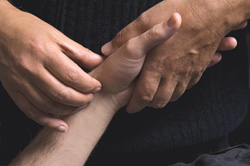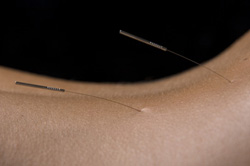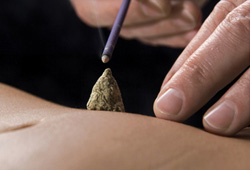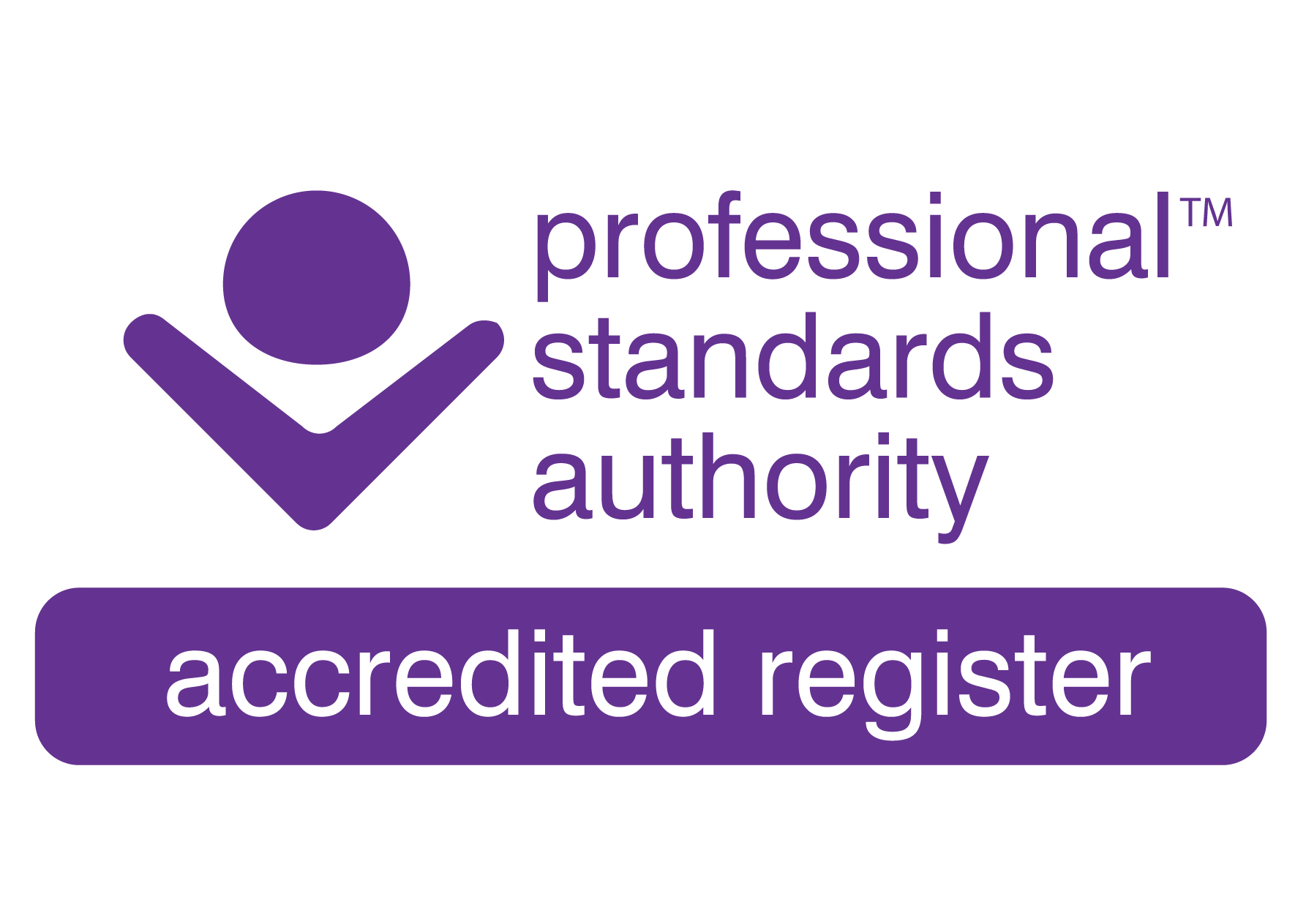

Traditional Acupuncture in Perth with Wallace Gilbraith:
Getting in touch with the You you're meant to be

- Home
- What is acupuncture?
- What is involved?
- Traditional diagnosis
- Treatment visits
- How many visits?
- N is for Needles
- Possible side-effects
- Possible side-effects
- Can I give blood after acupuncture?
- What can I do to help myself?
- What does it cost?
- Contacts
- About Wallace
- FAQs
Know what you're looking for? Search here ...
What is involved?

Traditional diagnosis
The first Acupuncture session is normally a thorough assessment of your present condition, based on Traditional Acupuncture principles - the Traditional Diagnosis - and may take up to 2 hours. This session may or may not include treatment. In either case, many people find it very helpful to simply take the time to examine, and become aware of, the patterns in their life.
As well as giving you the chance to explain the detail of your medical history (including current medication) and family background, Wallace will encourage you to describe your sleep, your diet, your digestion, your likes and dislikes, your hopes and expectations.
 The assessment includes a physical examination which normally includes taking the pulse at the wrists, looking at your tongue, palpation of your abdomen, and so on. You may be asked to undress to underwear; blankets are provided for comfort and modesty.
The assessment includes a physical examination which normally includes taking the pulse at the wrists, looking at your tongue, palpation of your abdomen, and so on. You may be asked to undress to underwear; blankets are provided for comfort and modesty.
It is helpful if you can attend without fragrance or make-up, if possible. Try not to come within an hour of a large meal, and try not to have recently taken food or drink which colours the tongue (eg coffee).
If you are receiving treatment from your General Practitioner or other health practitioner, it is sensible and courteous to let them know of your plans to have Traditional Acupuncture. If you are taking medication and would rather take less or stop, it is very important that you discuss this with your prescribing physician, who may be only too pleased to help. You should let Wallace know about any medication you are taking, as it may affect your response to treatment.
top ...Treatment visits
Treatment sessions are normally up to one-hour in length. Treatment is carried out with needles and moxa as appropriate. Wallace will continuously re-evaluate your condition, as the relief of initial symptoms may reveal underlying patterns of imbalance not originally evident.
Treatments are usually weekly for the first few visits. This gives you the chance to gain some momentum, and gives Wallace the chance to ensure that the treatment is properly tailored to your needs. Thereafter, treatments can be arranged fortnightly, monthly, or at intervals to suit you.
top ...How many visits?
No-one can say how many treatments you will need. It depends how much better you want to get.
Some people are satisfied with the improvement after two or three treatments. Many others find that the treatment for their 'main complaint' has had positive side-effects, and they wish to continue with treatment on a regular basis indefinitely, like going for a check-up.
It's a good idea to be prepared for five or six treatments, by which time it should be clear whether you are noticing the improvement you had hoped for.
top ...N is for Needles
Yes, acupuncture involves needles. These are not like the needles used by the doctor for injections, or the nurse for blood tests. In their needles, the important bit is the hole up the middle, so the needle needs to be that much fatter; the needles also need to be robust enough to penetrate to the required depth. Acupuncture needles are extremely thin, and are solid and quite flexible. All are pre-packed sterilised disposable needles, safely disposed by a reputable contractor. Needle insertion is well-practiced and very gentle.
 Needles are inserted into acupuncture points, at specific locations on the channels where the qi can be effectively accessed. A millimetre either side can make all the difference between properly accessing the chosen point, or not. When the needle reaches the point, it's not uncommon to feel a slight sensation, often described as a tingling, or a dull ache, and which generally fades quickly. Depending on the intention of the practitioner, needles may be inserted and removed straight away, or they may be inserted and left in for a while.
Needles are inserted into acupuncture points, at specific locations on the channels where the qi can be effectively accessed. A millimetre either side can make all the difference between properly accessing the chosen point, or not. When the needle reaches the point, it's not uncommon to feel a slight sensation, often described as a tingling, or a dull ache, and which generally fades quickly. Depending on the intention of the practitioner, needles may be inserted and removed straight away, or they may be inserted and left in for a while.
Because treatment is tailored to the needs of you as a unique individual, the points used will vary between individuals, even those presenting with what appears to be the same complaint. The points used may or may not be near to where the problem appears to be. For example, problems in the trunk or head may be treated using points on the hands or feet.
Treatment may also include the use of moxa. This is a smouldering herb, derived from Mugwort (Artemisia vulgaris). Various grades may be used, according to desired effect. Moxa may be placed on or near the skin or the needles in order to warm the points up, often prior to but sometimes instead of needling. The skin is protected from excessive heat.

Possible side effects
Many people report feeling relaxed, sometimes combined with feelings of tiredness after the first treatment or two, and being energised after subsequent treatments.
Acupuncture is generally regarded as being extremely safe, as it allows, rather than imposes, change. Any treatment that works will affect the way you feel. It's easy to call these changes 'good' if they make you feel better and 'bad' if they make you feel worse. However, even if your symptoms worsen for a while, that is a sign that something is changing within you. Without some change, how can there be healing?
Changes that make you feel worse are very unlikely to persist for more than 48 hours after treatment. Such short-term reactions should be reported at your next appointment. If, however, you still feel 'not right' three or more days later, please phone to discuss whether a sooner repeat appointment (for which there may be no charge) might be appropriate.
Effects that may be noticed include:
- Drowsiness: this may occur after treatment in a small number of patients. You would be wise not to drive if you feel drowsy. This is often indistinguishable from an unfamiliar sense of relaxation.
- Fainting is an occasional possibility, particularly at the first treatment. Patients who know they are prone to fainting should let Wallace know. In any case, you will be positioned and monitored in ways to ensure that if you do faint, the potential for harm is minimal.
- Pain: very rarely does treatment cause pain, as distinct from the sensation of the needling itself.
- If there are particular risks that apply in your case, Wallace will discuss these with you.
Tolerance to alcohol and exercise may be lowered after treatment. It's a good idea to not plan for a late night, or anything too strenuous, on the day of a treatment. Rest and relax if you can, and let the treatment work. Even if you feel energised after treatment, that energy may be better stored within you to improve your health rather than spent straight away on hard work or a session in the gym.
top ...Can I give blood after acupuncture?
The short answer is no, not within 4 months of treatment.
The longer answer is that the NHS Blood Transfusion Service are the authority on this, and their web page about Who Can't Give Blood? currently (Jun 2014) says that you should not give blood if 'you have had acupuncture in the last 4 months, unless this was done within the NHS or by a qualified Healthcare Professional registered with a statutory body'. The guidlines behind this are also online, at page about 'complementary therapy' in general, and this lists the statutory bodies who are recognised in this regard. The British Acupuncture Council (BAcC) is not one of them. Statutory regulation for acupuncture is currently off the political agenda, in part because the standards set by the BAcC for its members are so high that there is no strong sense of a need for any further regulation. BAcC members are among the safest health practitioners (of any discipline) in the country. The BAcC are in discussion with the Blood Transfusion Service to see if they will recognise this safety record; the BTS require evidence that satisfies their own criteria, and this all takes time. For now, you will not be able to give blood until 4 months after treatement with Wallace, and this situation is unikely to change in the forseeable future. top ...What can I do to help myself?
Moderation and variety are basic to health. As your treatment progresses you may find ways of applying these principles to your diet, medication (in consultation with your prescribing doctor), exercise, sleep, habits, and so on.
General guidelines are useful starting points:
- Five portions of fresh fruit or vegetables daily
- 2 litres of fresh water daily
- 30 minutes of aerobic exercise twice a week
- Eight hours sleep a night
- For women, less than 14 units of alcohol per week
- For men, less than 21 units of alcohol per week
- Cut down or stop smoking
- Learn to relax (stress is a major contributor to a lower immune response)
- Smile
There are no strict rules; you will have to find out what is right for you. Finding out the appropriate way for you to live your life is part of the process of recovering and improving your health.
During times of restriction in response to the Covid-19 pandemic, a few other thoughts may be helpful:
- Staying active and getting fresh air is important for physical and mental wellbeing. Whatever your normal exercise routine, home practise, or a brisk session in the fresh air each day (even if only in front of an open window), can also bring rewards. You may find pleasant things to do in the garden, if you have access, and weather permitting.
- Regarding eating well - in addition to what we ingest as food, let's include what we ingest as information. Be careful of bingeing on news, and seek out positivity and self-empowerment where you can.
- Social contacts can be maintained remotely - we may find ourselves keeping more in contact by telephone.
- We may even enjoy reading, or resting.
- This time will pass. Find balance.
What does it cost?
Traditional Acupuncture with Wallace offers excellent value for money:
- Free 'no-obligation quote' consultation - usually 10-15 mins - FREE
- Traditional Diagnosis - normally about 2 hrs - £70.00
- Treatment visits - normally about 1 hr - £50.00
Payment is normally by cash or cheque on the day.
Payment by e-banking is available for regular patients, and for those with a smartphone, Wallace also accepts payment by PayPal and Paym
Alas, no payment by plastic card.
Home visits may be possible by special arrangement, but cannot be guaranteed.
Appointments missed or cancelled at less than 24 hours notice may be charged in whole or in part.
Wallace is not a registered provider with any private healthcare scheme. Policy holders are advised to check with their providers what can be claimed, and how. Receipts are provided on request.
top ...
